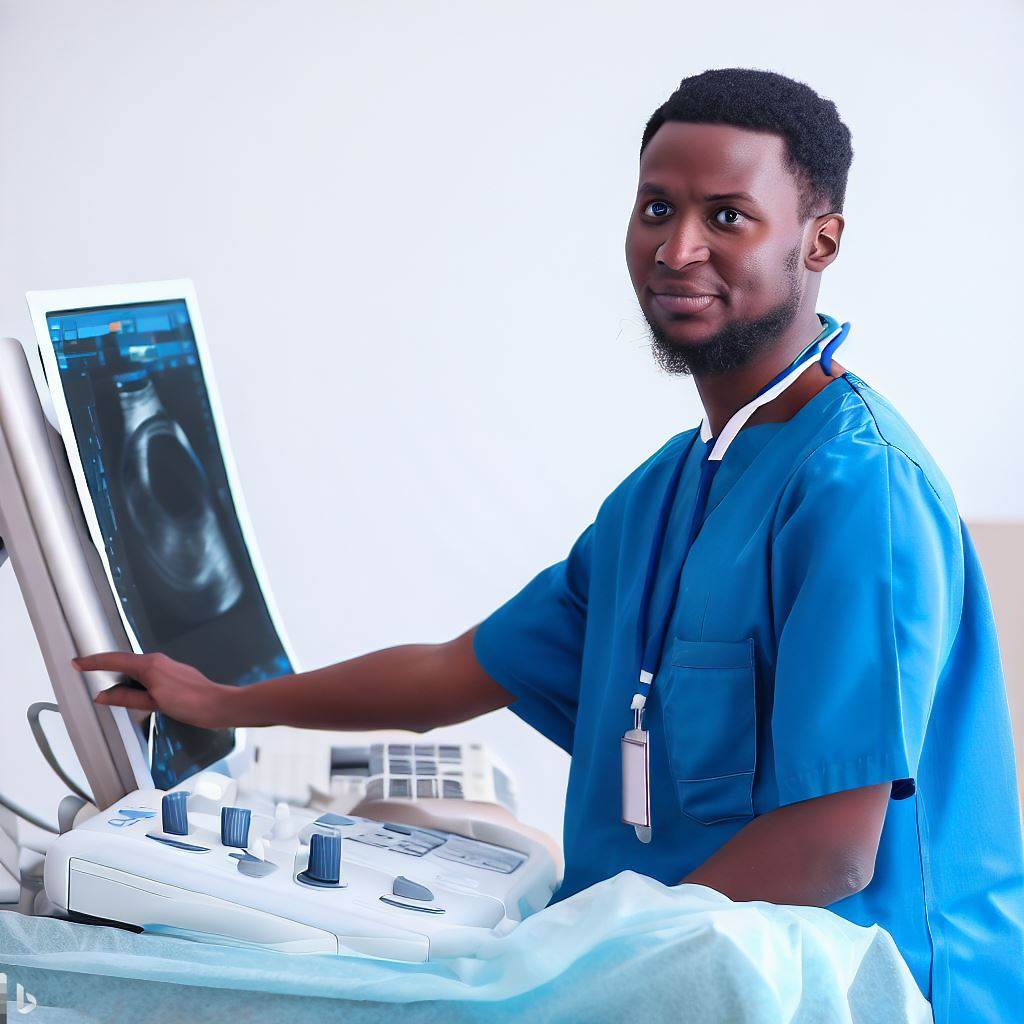Introduction
Brief explanation of prenatal care
Role of Medical Sonographers in Prenatal Care: Ensuring healthy pregnancies through check-ups, tests, and counseling for expectant mothers. Prenatal care is crucial for the well-being of both the mother and the baby.
Importance of Prenatal Care in Ensuring a Healthy Pregnancy
Prenatal care plays a significant role in identifying and managing any potential health risks during pregnancy. Regular check-ups help in monitoring the growth and development of the baby, detecting any abnormalities, and addressing them promptly. It also allows healthcare professionals to provide essential guidance on nutrition, exercise, and lifestyle choices for the mother.
Thesis Statement: Medical sonographers play a vital role in prenatal care in Nigeria
Medical sonographers are trained professionals who specialize in using ultrasound technology to generate images of the developing fetus in the womb. These images provide valuable information about the health and well-being of the baby and the mother. Sonographers are responsible for conducting ultrasound scans and interpreting the results. They assess the growth of the fetus, check for any abnormalities or complications, and monitor the placenta and amniotic fluid levels.
Sonographers also play a crucial role in determining the baby’s position and gender and can provide information about multiple pregnancies. Their expertise allows them to assist healthcare providers in making accurate diagnoses, developing appropriate treatment plans, and offering emotional support to expectant parents. By working closely with obstetricians and other medical professionals, medical sonographers contribute substantially to ensuring a safe and healthy pregnancy for women in Nigeria.
Most importantly, prenatal care is essential for the well-being of pregnant women and their babies. Medical sonographers play a vital role in this process by using ultrasound technology to monitor and assess the development of the fetus.
Their expertise helps in diagnosing any potential health risks, ensuring timely intervention, and supporting expectant parents throughout their pregnancy journey.
Overview of Prenatal Care in Nigeria
Current state of prenatal care in Nigeria
- Prenatal care in Nigeria is characterized by various challenges and limitations.
- Limited access to quality healthcare facilities is a major issue in prenatal care.
- The lack of skilled medical professionals, including sonographers, hampers the provision of adequate care.
- Pregnant women often face long waiting times and overcrowded clinics during prenatal visits.
- Inadequate infrastructure and equipment further contribute to the subpar state of prenatal care.
Challenges and limitations faced by pregnant women
- Pregnant women in Nigeria often experience challenges such as cultural and societal barriers.
- Lack of awareness about the importance of prenatal care leads to late initiation of care.
- Financial constraints prevent many women from seeking timely and comprehensive prenatal care.
- Geographical barriers, especially in rural areas, hinder access to prenatal services.
- Limited availability of ultrasound services and the high cost of ultrasound examinations pose additional challenges.
Need for improved prenatal care services
- Improving prenatal care services is crucial for reducing maternal and infant mortality rates in Nigeria.
- Increased access to quality healthcare facilities and skilled sonographers is essential.
- Promoting community awareness about the benefits of prenatal care can encourage early initiation.
- Government intervention is necessary to address financial barriers to prenatal care.
- Strengthening infrastructure and equipment in healthcare facilities will enhance the quality of care.
Basically, the current state of prenatal care in Nigeria is characterized by numerous challenges and limitations. Pregnant women face barriers such as limited access to quality healthcare facilities, lack of skilled medical professionals, long waiting times, and inadequate infrastructure.
To address these issues, there is a need for improved prenatal care services, including increased access to quality facilities and skilled sonographers. Awareness campaigns and government intervention can help overcome challenges related to cultural barriers, financial constraints, and geographical obstacles.
Ultimately, enhancing prenatal care services is vital for reducing maternal and infant mortality rates in Nigeria.
Read: Midwifery in Nigeria: The Heroes of Maternal Health
What is a Medical Sonographer?
Definition and role of a medical sonographer
- A medical sonographer is a healthcare professional who uses ultrasound technology to produce images of the body’s internal structures.
- Their role involves conducting diagnostic procedures to assist in the diagnosis and treatment of various medical conditions.
- They work closely with physicians and other healthcare professionals to provide accurate and detailed imaging.
- Medical sonographers specialize in different areas such as obstetrics and gynecology, cardiac, abdominal, vascular, or musculoskeletal sonography.
- These specialized areas allow them to focus on specific body systems and provide specialized diagnostic services.
Skills and qualifications required to become a medical sonographer
- Medical sonographers must possess strong technical skills in operating ultrasound equipment and image analysis.
- They need to have a solid understanding of human anatomy and physiology to correctly interpret the images captured.
- A thorough knowledge of ultrasound physics and the ability to troubleshoot technical issues is crucial.
- Excellent communication skills are essential as they interact with patients, explaining procedures, and putting them at ease.
- Education and training include obtaining an associate or bachelor’s degree in diagnostic medical sonography.
- Certifications from recognized organizations like the American Registry for Diagnostic Medical Sonography (ARDMS) are required.
Importance of medical sonographers in healthcare
- Medical sonographers play a vital role in prenatal care in Nigeria by conducting obstetric ultrasounds.
- These ultrasounds provide critical information about the baby’s development, identifying any abnormalities or potential issues.
- Early detection of abnormalities can help healthcare professionals plan appropriate interventions and treatments.
- Medical sonographers also assist in monitoring the baby’s growth, position, and well-being throughout the pregnancy.
- They provide crucial support during high-risk pregnancies and help ensure the safest possible delivery for both the mother and the baby.
- Their expertise allows them to detect conditions such as ectopic pregnancies, placenta previa, and fetal abnormalities.
- Collaboration with other healthcare professionals, such as obstetricians, radiologists, and genetic counselors, ensures comprehensive care.
- Medical sonographers also contribute to research studies and advancements in prenatal care, helping improve healthcare outcomes.
- Their role extends beyond prenatal care, as they assist in diagnosing and monitoring various medical conditions in other areas of the body.
- With their skills and expertise, medical sonographers provide valuable information to guide treatment decisions.
Overall, medical sonographers are crucial members of the healthcare team in Nigeria.
They possess the skills and qualifications necessary to perform diagnostic procedures and provide accurate and detailed imaging. Their role in prenatal care ensures the health and well-being of both the mother and the baby.
By detecting potential issues early, they help healthcare professionals plan appropriate interventions and treatments. Their contributions extend beyond prenatal care, as they assist in diagnosing and monitoring various medical conditions. With their expertise, medical sonographers play a significant role in improving healthcare outcomes in Nigeria.
Read: Optometry in Nigeria: A Vision of Healthy Future
The Role of Medical Sonographers in Prenatal Care
Conducting ultrasounds and imaging procedures
- Determining the number of weeks pregnant using ultrasound technology.
- Assessing fetal growth and development through ultrasound scans.
- Detecting abnormalities or complications in the fetus during ultrasound examinations.
Providing essential information to healthcare professionals
- Working collaboratively with doctors and nurses to ensure comprehensive prenatal care.
- Assisting in diagnosing and monitoring pregnancies through ultrasound results.
Ensuring patient comfort and safety during procedures
- Maintaining a calm and reassuring environment to ease patients’ anxiety during ultrasounds.
- Practicing proper hygiene and infection control measures to prevent cross-contamination.
Medical sonographers in Nigeria play a crucial role in prenatal care by
- Conducting ultrasounds to determine weeks pregnant and monitor fetal development.
- Detecting abnormalities early for timely medical intervention.
- Providing essential information to doctors and nurses for accurate diagnoses.
- Creating a calm and reassuring environment for patient comfort.
- Prioritizing hygiene and infection control to protect patients during procedures.
Their expertise ensures healthy pregnancies and optimal outcomes for mothers and babies alike.
Read: Anatomy of Nigeria’s Healthcare Professions: Salary Guide

Benefits of Medical Sonography in Prenatal Care
Early detection of potential health issues
- Sonography allows for the early detection of potential health issues in the fetus.
- The detailed images produced by sonography can reveal abnormalities or developmental concerns.
- Medical sonographers can identify conditions such as chromosomal abnormalities or birth defects.
- Early detection enables medical professionals to offer appropriate interventions and treatments.
- Parents can receive timely information, allowing them to prepare emotionally and make informed decisions.
Facilitating timely interventions and treatments
- Medical sonography helps medical professionals evaluate the health and growth of the fetus.
- Monitoring fetal development allows for early interventions to address any potential complications.
- Doctors can provide the necessary treatment plans to ensure the well-being of both the mother and baby.
- Sonography enables healthcare providers to assess the fetus’s response to interventions and adjust as needed.
- Timely interventions can prevent further complications and promote healthier outcomes for the mother and baby.
Reducing maternal and infant mortality rates
- Medical sonography plays a crucial role in reducing maternal and infant mortality rates in Nigeria.
- Early detection and monitoring of high-risk pregnancies allow for appropriate medical interventions.
- Sonography helps identify complications like ectopic pregnancies or placenta previa that can be life-threatening.
- Healthcare providers can closely monitor the growth and well-being of the fetus throughout the pregnancy.
- Identifying potential problems early on allows for timely interventions and prevents adverse outcomes.
- Reducing maternal and infant mortality rates requires access to quality prenatal care, including medical sonography.
In summary, medical sonography offers several benefits in prenatal care in Nigeria. Through early detection of potential health issues, it allows for timely interventions and treatments.
This, in turn, helps reduce maternal and infant mortality rates. By prioritizing access to medical sonography, Nigeria can significantly improve the outcomes of pregnancies and ensure the well-being of both mothers and their babies.
Read: Physiotherapy: A Growing Demand in Nigerian Healthcare
Training and Education for Medical Sonographers in Nigeria
In order to become a medical sonographer in Nigeria, individuals must undergo specific training and education. Let’s explore the process and requirements involved:
Availability of Accredited Training Programs
- Nigeria boasts several accredited training programs for aspiring medical sonographers.
- These programs are offered by reputable institutions across the country.
- Individuals can choose from a variety of educational institutions and programs that suit their needs.
- Accredited training programs provide students with the necessary theoretical knowledge and practical skills.
- These programs are designed to ensure that aspiring sonographers are well-prepared for their future roles.
Required Certifications and Licenses
- Upon completing their training, individuals must obtain the necessary certifications and licenses.
- In Nigeria, the Medical Sonographers Association of Nigeria (MOSAN) is responsible for certification.
- MOSAN sets the standards and guidelines for certification in the field of medical sonography.
- Aspiring sonographers must pass the certification examination administered by MOSAN.
- Once certified, individuals can legally practice as medical sonographers in Nigeria.
Continuing Education and Professional Development Opportunities
- Continuous learning and professional development are crucial in the field of medical sonography.
- Several opportunities for continuing education are available to practicing sonographers in Nigeria.
- Workshops, conferences, and seminars are organized by professional associations like MOSAN.
- These events provide sonographers with the latest advancements and updates in their field.
- Attending such events helps sonographers enhance their skills and stay up-to-date with industry trends.
Generally, training and education are vital aspects of becoming a medical sonographer in Nigeria. Accredited training programs, along with certifications and licenses, ensure that individuals are well-equipped to provide quality prenatal care. Additionally, continuous professional development opportunities enable sonographers to stay current in their field and deliver the best possible care to expectant mothers and their babies.
Challenges Faced by Medical Sonographers in Nigeria
Lack of awareness and recognition of the profession
- Medical sonographers in Nigeria often face the challenge of their profession being misunderstood or unknown.
- Many individuals are not aware of the crucial role medical sonographers play in prenatal care.
- This lack of awareness leads to a lack of recognition for their expertise and contribution to healthcare.
- Increased awareness is needed to educate the public and stakeholders about the importance of medical sonography in prenatal care.
Limited resources and equipment
- A significant challenge faced by medical sonographers in Nigeria is the scarcity of resources and advanced equipment.
- High-quality ultrasound machines and other necessary devices are often lacking in healthcare facilities.
- Outdated technology can hinder accurate diagnosis and affect the overall quality of prenatal care.
- Improving access to modern equipment and ensuring regular maintenance is essential to overcome this challenge.
Addressing cultural and societal beliefs around prenatal care
- Cultural and societal beliefs surrounding pregnancy and prenatal care can present hurdles for medical sonographers.
- Superstitions and myths may cause pregnant women to hesitate in seeking medical sonography services.
- Some communities have traditional practices or beliefs that discourage or overlook the importance of prenatal care.
- Engaging with communities, promoting education, and debunking myths are necessary to overcome these challenges.
Overcoming these challenges
- Government support and investment in promoting the medical sonography profession can raise awareness and recognition.
- Increasing funding for healthcare facilities will help improve resources and ensure availability of advanced equipment.
- Collaboration and partnerships with international organizations can aid in obtaining necessary resources and training opportunities.
- Conducting community outreach programs and awareness campaigns will address cultural and societal beliefs.
- Offering educational programs and workshops can enhance knowledge and understanding of prenatal care.
In general, medical sonographers in Nigeria face various challenges including lack of awareness and recognition, limited resources and equipment, and cultural beliefs around prenatal care. Overcoming these challenges requires collective efforts from the government, healthcare institutions, and communities. By raising awareness, improving resources, and addressing cultural beliefs, the role of medical sonographers in prenatal care can be enhanced, leading to better maternal and fetal health outcomes.
Recommendations for Improving the Role of Medical Sonographers
Advocacy for increased funding and resources
- Highlight the importance of medical sonographers in prenatal care to policymakers.
- Advocate for increased budget allocation for training and equipment for sonographers.
- Collaborate with relevant stakeholders to lobby for funding from international organizations.
- Organize conferences and workshops to raise awareness among donors and potential sponsors.
Promoting public awareness and education on prenatal care
- Develop public campaigns to raise awareness about the role of medical sonographers in prenatal care.
- Create informational materials, brochures, and videos targeting pregnant women and their families.
- Collaborate with media outlets to disseminate information on the importance of prenatal care.
- Organize community outreach programs to educate the public about prenatal diagnostic procedures.
Collaborating with healthcare authorities to develop policies and regulations
- Engage with government health departments to advocate for the development of policies and regulations regarding medical sonography.
- Participate in discussions and provide expert input on the integration of sonography into prenatal care guidelines.
- Collaborate with professional associations to establish licensing and certification requirements for sonographers.
- Regularly update knowledge and skills through continuing education programs to ensure compliance with evolving regulations.
By implementing these recommendations, the role of medical sonographers in prenatal care in Nigeria can be greatly improved. Increased funding and resources will enable sonographers to access state-of-the-art equipment and undergo comprehensive training. Public awareness campaigns will ensure that expectant mothers understand the importance of prenatal care and the role of sonographers in diagnosing and monitoring their pregnancies.
Collaboration with healthcare authorities will lead to the development of appropriate policies and regulations that govern the practice of medical sonography, ensuring high-quality services and patient safety.
Conclusion
Recap of the importance of medical sonographers in prenatal care
Medical sonographers play a crucial role in prenatal care in Nigeria, providing essential diagnostic imaging services. They contribute to the early detection of fetal abnormalities and help monitor the overall health of both mother and baby. Their expertise is invaluable in guiding healthcare decisions and ensuring the well-being of pregnant women.
Call to action for better support and recognition of medical sonographers in Nigeria’s healthcare system
It is imperative that Nigerian healthcare authorities prioritize the development of the profession by providing adequate training programs and resources.
Moreover, policymakers should recognize the importance of medical sonographers in prenatal care and integrate them as indispensable members of the healthcare team.
By doing so, we can improve access to quality prenatal care and contribute to better maternal and fetal health outcomes in Nigeria.




